Analysis of International Human Rights Law: History and Challenges
VerifiedAdded on 2023/06/09
|5
|1038
|394
Essay
AI Summary
This essay provides a comprehensive overview of international human rights law, beginning with a definition of human rights and their fundamental importance, emphasizing equality and non-discrimination. It traces the historical development of human rights, from ancient concepts of natural rights to the Universal Declaration of Human Rights and the establishment of the United Nations. The essay analyzes the weaknesses of the UN in enforcing human rights policies, including the discretionary power of member states and a lack of democratic mechanisms. It identifies key challenges, such as poverty, inequalities, and discrimination, that hinder the application of human rights principles. Finally, the essay underscores the individual's duty to uphold and advocate for human rights, including the abolition of slavery and the promotion of fundamental rights like education and freedom of movement. The essay references key scholars and historical documents, supporting its arguments with authoritative sources.
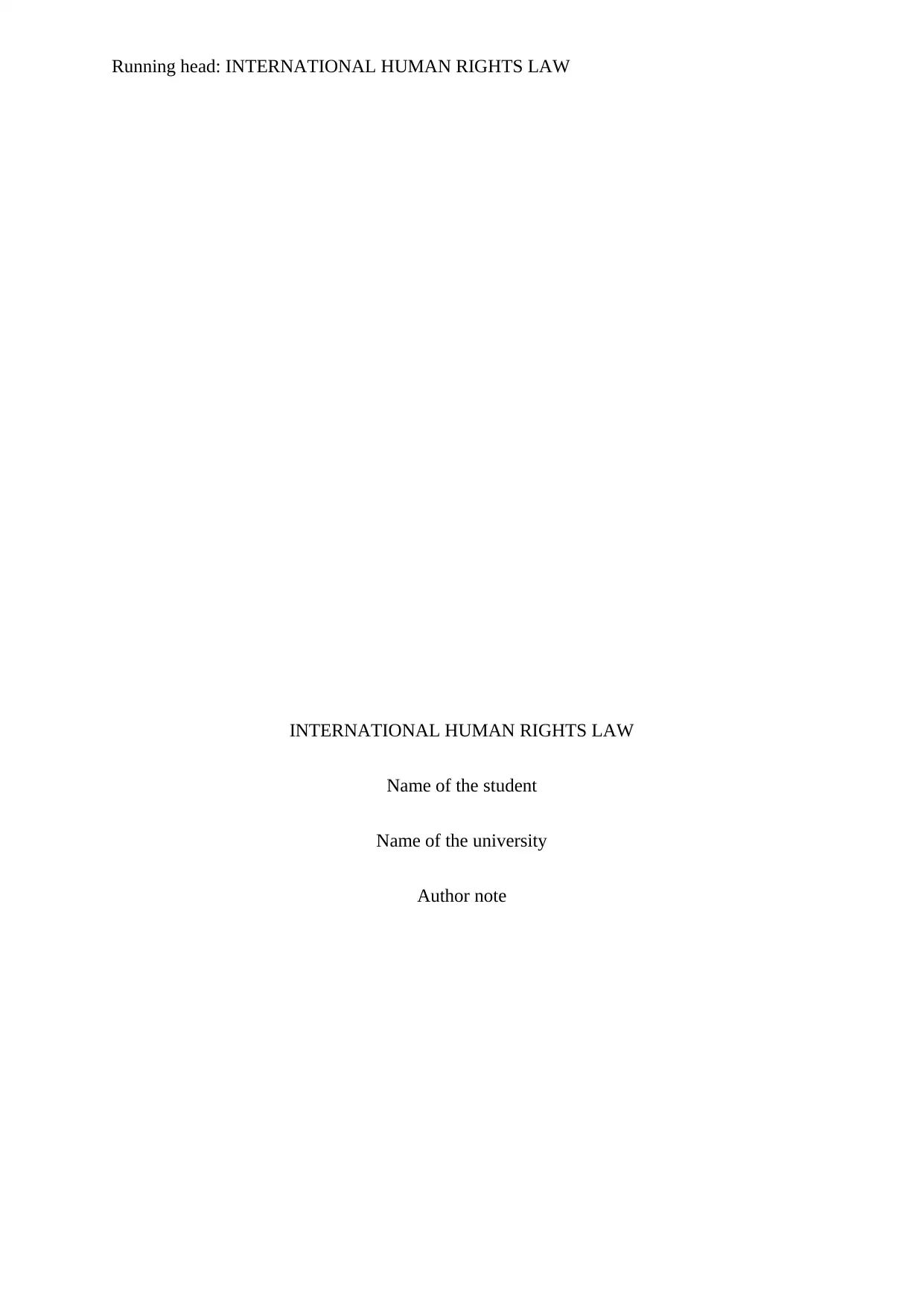
Running head: INTERNATIONAL HUMAN RIGHTS LAW
INTERNATIONAL HUMAN RIGHTS LAW
Name of the student
Name of the university
Author note
INTERNATIONAL HUMAN RIGHTS LAW
Name of the student
Name of the university
Author note
Paraphrase This Document
Need a fresh take? Get an instant paraphrase of this document with our AI Paraphraser
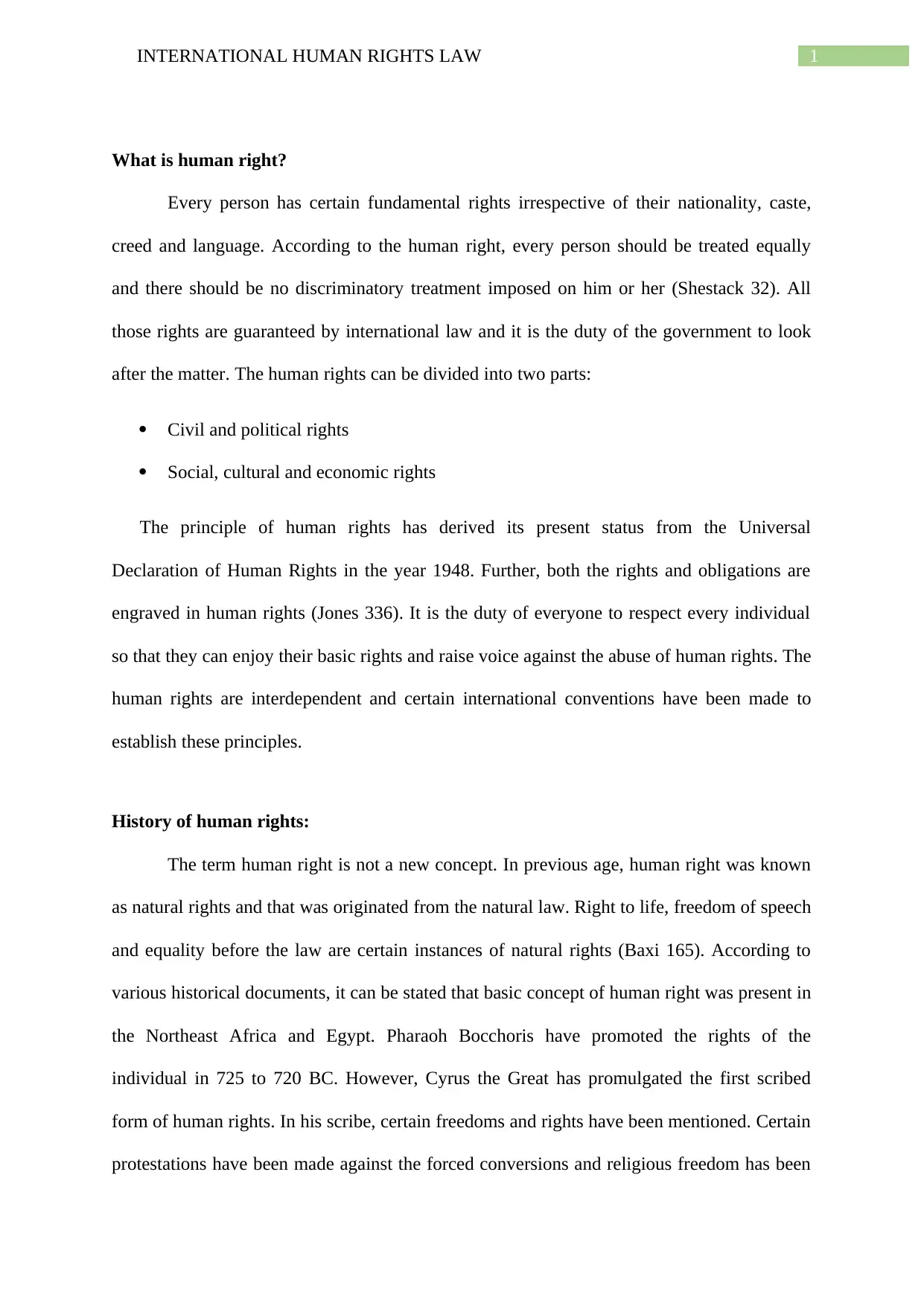
1INTERNATIONAL HUMAN RIGHTS LAW
What is human right?
Every person has certain fundamental rights irrespective of their nationality, caste,
creed and language. According to the human right, every person should be treated equally
and there should be no discriminatory treatment imposed on him or her (Shestack 32). All
those rights are guaranteed by international law and it is the duty of the government to look
after the matter. The human rights can be divided into two parts:
Civil and political rights
Social, cultural and economic rights
The principle of human rights has derived its present status from the Universal
Declaration of Human Rights in the year 1948. Further, both the rights and obligations are
engraved in human rights (Jones 336). It is the duty of everyone to respect every individual
so that they can enjoy their basic rights and raise voice against the abuse of human rights. The
human rights are interdependent and certain international conventions have been made to
establish these principles.
History of human rights:
The term human right is not a new concept. In previous age, human right was known
as natural rights and that was originated from the natural law. Right to life, freedom of speech
and equality before the law are certain instances of natural rights (Baxi 165). According to
various historical documents, it can be stated that basic concept of human right was present in
the Northeast Africa and Egypt. Pharaoh Bocchoris have promoted the rights of the
individual in 725 to 720 BC. However, Cyrus the Great has promulgated the first scribed
form of human rights. In his scribe, certain freedoms and rights have been mentioned. Certain
protestations have been made against the forced conversions and religious freedom has been
What is human right?
Every person has certain fundamental rights irrespective of their nationality, caste,
creed and language. According to the human right, every person should be treated equally
and there should be no discriminatory treatment imposed on him or her (Shestack 32). All
those rights are guaranteed by international law and it is the duty of the government to look
after the matter. The human rights can be divided into two parts:
Civil and political rights
Social, cultural and economic rights
The principle of human rights has derived its present status from the Universal
Declaration of Human Rights in the year 1948. Further, both the rights and obligations are
engraved in human rights (Jones 336). It is the duty of everyone to respect every individual
so that they can enjoy their basic rights and raise voice against the abuse of human rights. The
human rights are interdependent and certain international conventions have been made to
establish these principles.
History of human rights:
The term human right is not a new concept. In previous age, human right was known
as natural rights and that was originated from the natural law. Right to life, freedom of speech
and equality before the law are certain instances of natural rights (Baxi 165). According to
various historical documents, it can be stated that basic concept of human right was present in
the Northeast Africa and Egypt. Pharaoh Bocchoris have promoted the rights of the
individual in 725 to 720 BC. However, Cyrus the Great has promulgated the first scribed
form of human rights. In his scribe, certain freedoms and rights have been mentioned. Certain
protestations have been made against the forced conversions and religious freedom has been
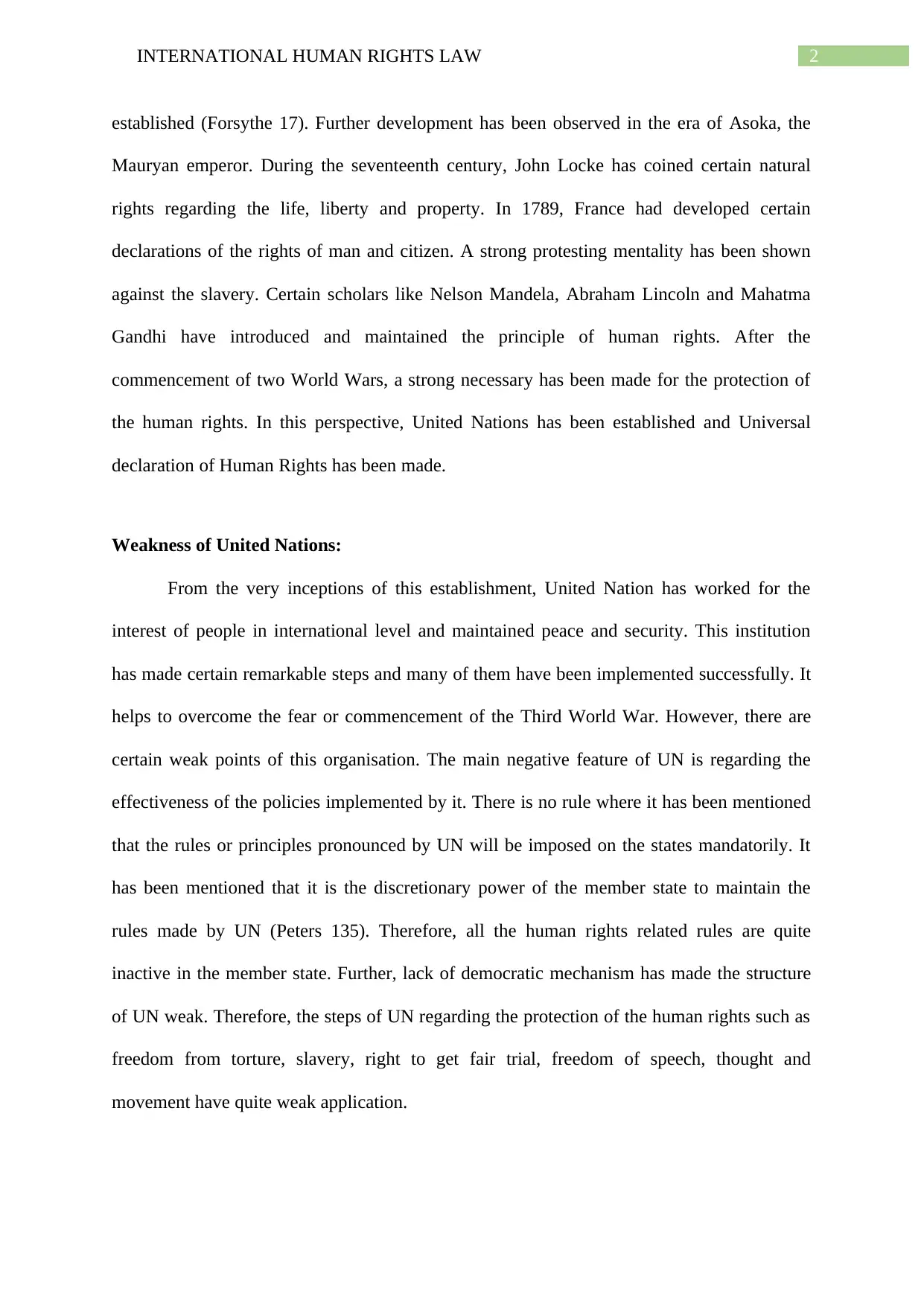
2INTERNATIONAL HUMAN RIGHTS LAW
established (Forsythe 17). Further development has been observed in the era of Asoka, the
Mauryan emperor. During the seventeenth century, John Locke has coined certain natural
rights regarding the life, liberty and property. In 1789, France had developed certain
declarations of the rights of man and citizen. A strong protesting mentality has been shown
against the slavery. Certain scholars like Nelson Mandela, Abraham Lincoln and Mahatma
Gandhi have introduced and maintained the principle of human rights. After the
commencement of two World Wars, a strong necessary has been made for the protection of
the human rights. In this perspective, United Nations has been established and Universal
declaration of Human Rights has been made.
Weakness of United Nations:
From the very inceptions of this establishment, United Nation has worked for the
interest of people in international level and maintained peace and security. This institution
has made certain remarkable steps and many of them have been implemented successfully. It
helps to overcome the fear or commencement of the Third World War. However, there are
certain weak points of this organisation. The main negative feature of UN is regarding the
effectiveness of the policies implemented by it. There is no rule where it has been mentioned
that the rules or principles pronounced by UN will be imposed on the states mandatorily. It
has been mentioned that it is the discretionary power of the member state to maintain the
rules made by UN (Peters 135). Therefore, all the human rights related rules are quite
inactive in the member state. Further, lack of democratic mechanism has made the structure
of UN weak. Therefore, the steps of UN regarding the protection of the human rights such as
freedom from torture, slavery, right to get fair trial, freedom of speech, thought and
movement have quite weak application.
established (Forsythe 17). Further development has been observed in the era of Asoka, the
Mauryan emperor. During the seventeenth century, John Locke has coined certain natural
rights regarding the life, liberty and property. In 1789, France had developed certain
declarations of the rights of man and citizen. A strong protesting mentality has been shown
against the slavery. Certain scholars like Nelson Mandela, Abraham Lincoln and Mahatma
Gandhi have introduced and maintained the principle of human rights. After the
commencement of two World Wars, a strong necessary has been made for the protection of
the human rights. In this perspective, United Nations has been established and Universal
declaration of Human Rights has been made.
Weakness of United Nations:
From the very inceptions of this establishment, United Nation has worked for the
interest of people in international level and maintained peace and security. This institution
has made certain remarkable steps and many of them have been implemented successfully. It
helps to overcome the fear or commencement of the Third World War. However, there are
certain weak points of this organisation. The main negative feature of UN is regarding the
effectiveness of the policies implemented by it. There is no rule where it has been mentioned
that the rules or principles pronounced by UN will be imposed on the states mandatorily. It
has been mentioned that it is the discretionary power of the member state to maintain the
rules made by UN (Peters 135). Therefore, all the human rights related rules are quite
inactive in the member state. Further, lack of democratic mechanism has made the structure
of UN weak. Therefore, the steps of UN regarding the protection of the human rights such as
freedom from torture, slavery, right to get fair trial, freedom of speech, thought and
movement have quite weak application.
⊘ This is a preview!⊘
Do you want full access?
Subscribe today to unlock all pages.

Trusted by 1+ million students worldwide
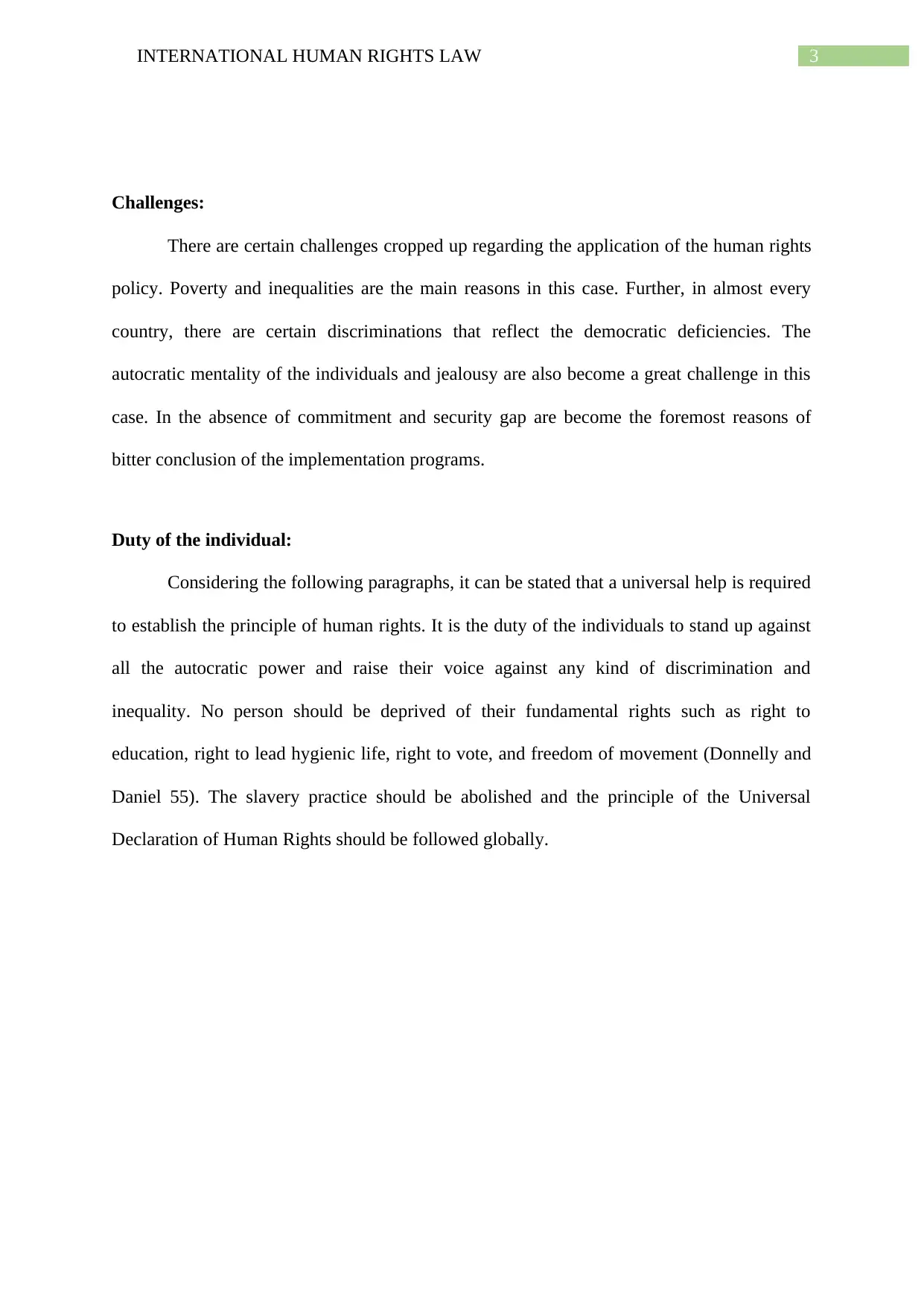
3INTERNATIONAL HUMAN RIGHTS LAW
Challenges:
There are certain challenges cropped up regarding the application of the human rights
policy. Poverty and inequalities are the main reasons in this case. Further, in almost every
country, there are certain discriminations that reflect the democratic deficiencies. The
autocratic mentality of the individuals and jealousy are also become a great challenge in this
case. In the absence of commitment and security gap are become the foremost reasons of
bitter conclusion of the implementation programs.
Duty of the individual:
Considering the following paragraphs, it can be stated that a universal help is required
to establish the principle of human rights. It is the duty of the individuals to stand up against
all the autocratic power and raise their voice against any kind of discrimination and
inequality. No person should be deprived of their fundamental rights such as right to
education, right to lead hygienic life, right to vote, and freedom of movement (Donnelly and
Daniel 55). The slavery practice should be abolished and the principle of the Universal
Declaration of Human Rights should be followed globally.
Challenges:
There are certain challenges cropped up regarding the application of the human rights
policy. Poverty and inequalities are the main reasons in this case. Further, in almost every
country, there are certain discriminations that reflect the democratic deficiencies. The
autocratic mentality of the individuals and jealousy are also become a great challenge in this
case. In the absence of commitment and security gap are become the foremost reasons of
bitter conclusion of the implementation programs.
Duty of the individual:
Considering the following paragraphs, it can be stated that a universal help is required
to establish the principle of human rights. It is the duty of the individuals to stand up against
all the autocratic power and raise their voice against any kind of discrimination and
inequality. No person should be deprived of their fundamental rights such as right to
education, right to lead hygienic life, right to vote, and freedom of movement (Donnelly and
Daniel 55). The slavery practice should be abolished and the principle of the Universal
Declaration of Human Rights should be followed globally.
Paraphrase This Document
Need a fresh take? Get an instant paraphrase of this document with our AI Paraphraser
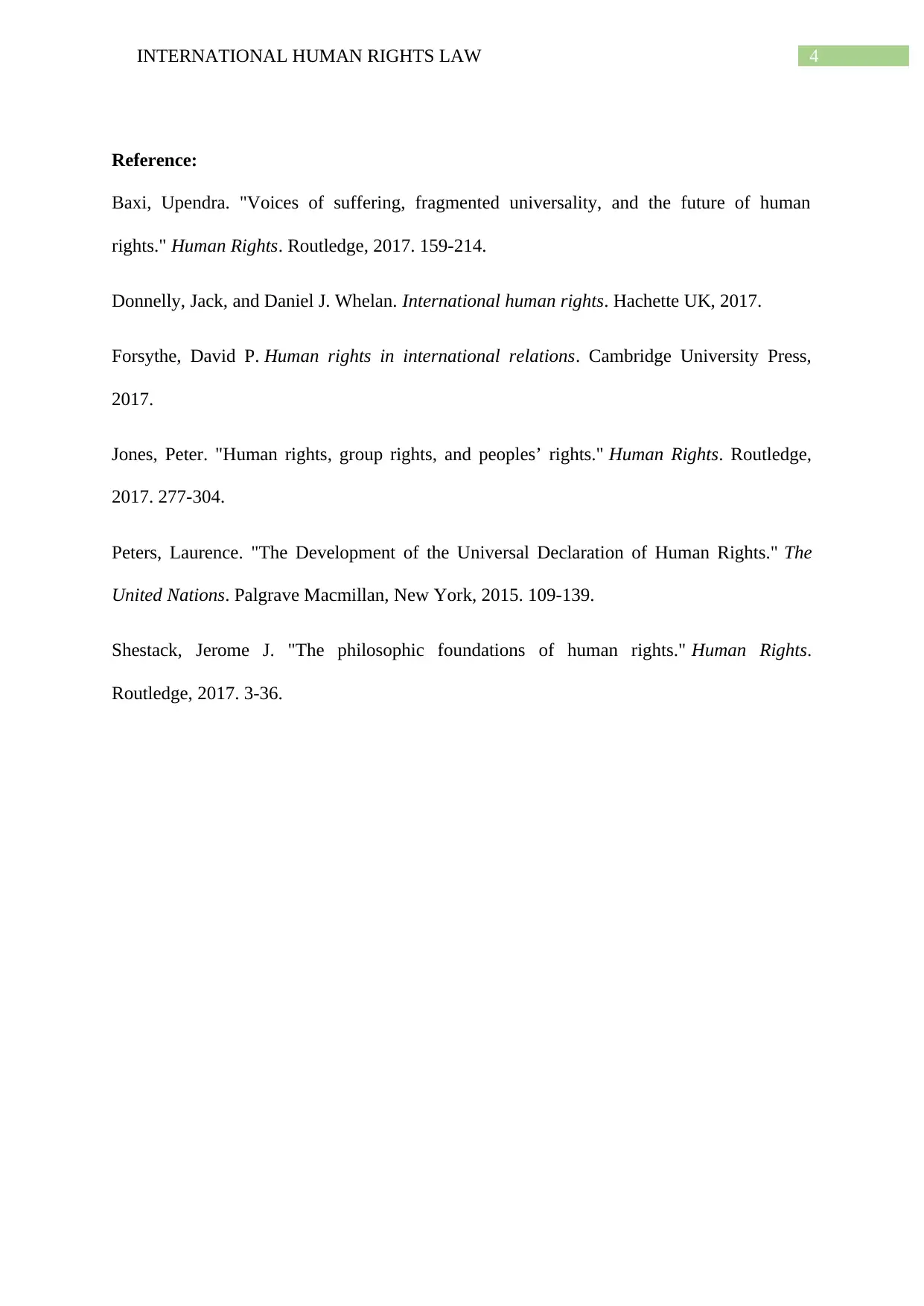
4INTERNATIONAL HUMAN RIGHTS LAW
Reference:
Baxi, Upendra. "Voices of suffering, fragmented universality, and the future of human
rights." Human Rights. Routledge, 2017. 159-214.
Donnelly, Jack, and Daniel J. Whelan. International human rights. Hachette UK, 2017.
Forsythe, David P. Human rights in international relations. Cambridge University Press,
2017.
Jones, Peter. "Human rights, group rights, and peoples’ rights." Human Rights. Routledge,
2017. 277-304.
Peters, Laurence. "The Development of the Universal Declaration of Human Rights." The
United Nations. Palgrave Macmillan, New York, 2015. 109-139.
Shestack, Jerome J. "The philosophic foundations of human rights." Human Rights.
Routledge, 2017. 3-36.
Reference:
Baxi, Upendra. "Voices of suffering, fragmented universality, and the future of human
rights." Human Rights. Routledge, 2017. 159-214.
Donnelly, Jack, and Daniel J. Whelan. International human rights. Hachette UK, 2017.
Forsythe, David P. Human rights in international relations. Cambridge University Press,
2017.
Jones, Peter. "Human rights, group rights, and peoples’ rights." Human Rights. Routledge,
2017. 277-304.
Peters, Laurence. "The Development of the Universal Declaration of Human Rights." The
United Nations. Palgrave Macmillan, New York, 2015. 109-139.
Shestack, Jerome J. "The philosophic foundations of human rights." Human Rights.
Routledge, 2017. 3-36.
1 out of 5
Related Documents
Your All-in-One AI-Powered Toolkit for Academic Success.
+13062052269
info@desklib.com
Available 24*7 on WhatsApp / Email
![[object Object]](/_next/static/media/star-bottom.7253800d.svg)
Unlock your academic potential
Copyright © 2020–2026 A2Z Services. All Rights Reserved. Developed and managed by ZUCOL.





